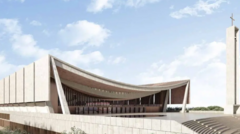The investigation comes in response to extensive spending without visible progress and public demands for accountability regarding the controversial project.
Ghana's President Initiates Investigation into Disputed National Cathedral Project

Ghana's President Initiates Investigation into Disputed National Cathedral Project
Ghana's government, under President John Mahama, to probe the $400 million national cathedral amid rising public outcry and economic instability.
Ghana is set to investigate plans for a National Cathedral, an ambitious project initially proposed by former President Nana Akufo-Addo, who had linked it to national prosperity. The cathedral, costing an estimated $400 million, has faced criticism as the nation grapples with a severe economic crisis, including high inflation rates at 23.8% and growing public discontent over essential services.
John Mahama, Ghana's current president, has announced an audit into the project's funding and feasibility after recent calls from citizens and political rivals. The project's financial implications have raised alarms, given that around $58 million of taxpayer money has already been allocated to a site in Accra, which currently resembles a large excavation rather than a place of worship.
"We will look closely into any misuse of public funds regarding this project,” Mahama stated during a recent thanksgiving service, though he didn't dismiss the potential completion of the cathedral. He suggested finding a more cost-effective solution and possibly relocating the cathedral to better fit the current economic climate.
Criticism around the cathedral has intensified, with voices like NDC lawmaker Kwabena Mintah Akandoh questioning the priorities of building a grand cathedral amidst pressing health and education needs in the country. Senior clergymen involved with the cathedral have also expressed concerns, leading to resignations from its board as dissatisfaction grows over the project's perceived misallocation of resources.
Ghana's new Finance Minister Cassiel Ato Forson indicated a shift away from public funding for the project, emphasizing the government's intention to eliminate unnecessary expenditures. As the country emerges from an International Monetary Fund-supported bailout, the consensus is that resources should be redirected towards more urgent societal challenges rather than a monumental religious structure.
The cathedral, intended to be a unified space for all Christians and to feature elements such as a Bible museum and national conference center, now faces an uncertain future as the new administration seeks to balance national interests with the expectations of its citizens.




















